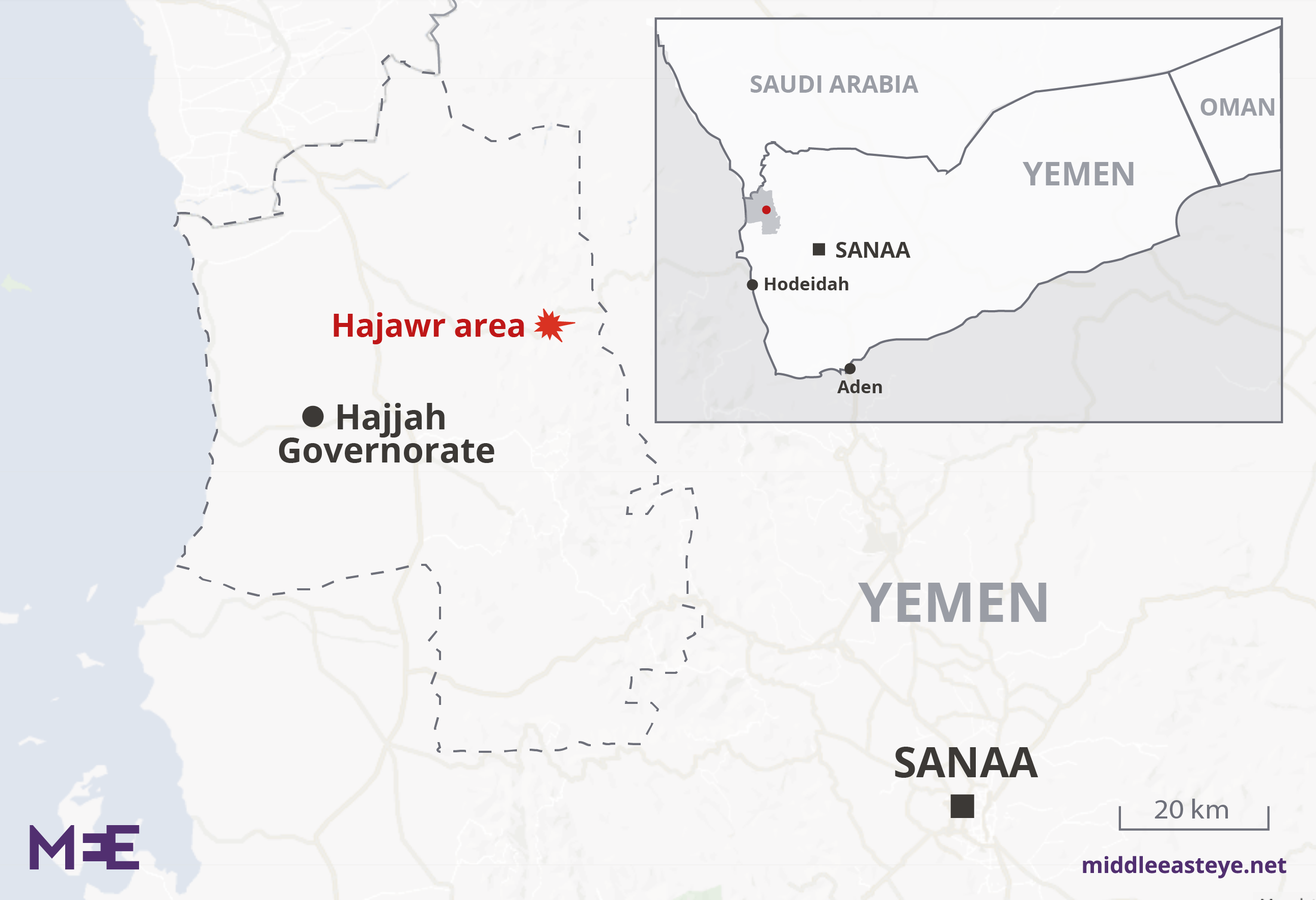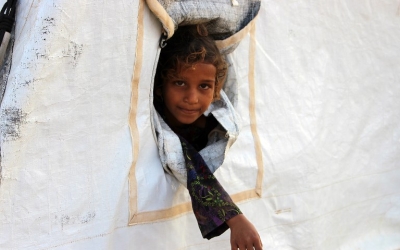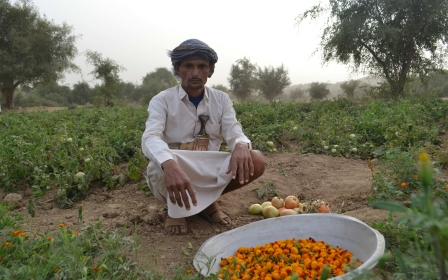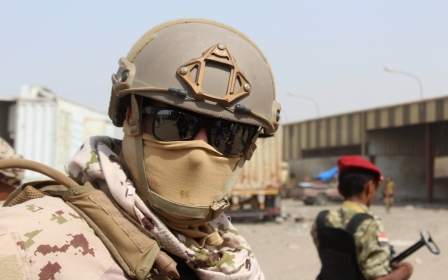Air strikes kill 12 children as chaos sown in Yemen's Hajjah province
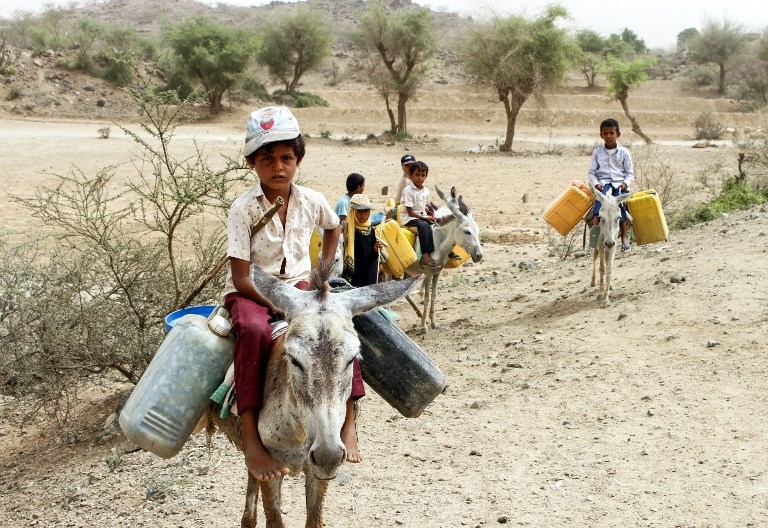
Air strikes have killed at least 22 civilians, including women and children, as residents in a northern Yemen province say they are caught between bombs and ground fighting after a month-long battle that besieged thousands.
Many civilians were killed and injured inside their houses during the battles in Hajawr
- Hajawr resident
The bombardment, which has continued on Tuesday, came as the Houthis overran a group of fighters who had been trying to kick the rebel group out from the Hajawr area of Hajjah province during more than a month of fighting.
Houthi forces blamed Saudi Arabia for the air strikes, but the Saudi-led coalition has denied it was responsible.
Medical sources quoted by the UN Humanitarian Coordinator in Yemen said the attacks in Hajjah's Kasher district killed 10 women and 12 children, and wounded 30 people, including 14 under the age of 18.
"Many of the injured children have been sent to hospitals in Abs district and in Sanaa for treatment and several require possible evacuation to survive," the UN coordinator in the country, Lise Grande, said in a statement.
New MEE newsletter: Jerusalem Dispatch
Sign up to get the latest insights and analysis on Israel-Palestine, alongside Turkey Unpacked and other MEE newsletters
“We fear that thousands of civilians are trapped between the parties [to the conflict] and lack the basic services they need to survive."
The Houthis have controlled much of northern Hajjah province, including the entire Hajawr area, since September 2014, the same month the movement seized the capital Sanaa.
But in February, a local tribal leader Sheikh Abu Muslim al-Za’akari rallied fighters from Hajawr to take on the Houthis. Fighting broke out and thousands of residents were trapped in their homes, living off stocked food, after the Houthis imposed a siege.
Analysts told Middle East Eye that the fighters - which numbered hundreds in the face of thousands of Houthis - were unlikely to win the battle, with one calling it an "absurd front" which would only benefit arms dealers and political leaders abroad.
We fear that thousands of civilians are trapped between the parties and lack the basic services they need to survive
- Lise Grande, UN Humanitarian Coordinator in Yemen
On Sunday, the Houthis recaptured Hajawr, killing dozens of fighters, including al-Za’akari and some of his relatives, and arresting others, Hajawr residents told MEE. While fighting stopped, the Houthis have continued to chase runaway fighters.
Then on Monday, bombs were dropped on houses in Hajawr's Kasher district, including al-Za'akari's home and those of fighters he led which are now under Houthi control, according to residents.
Residents said they believed that the Saudi-led coalition dropped the bombs because planes had been used, and Houthis have not used planes during the war. Houthi media outlets have accused the Saudi-led coalition while Saudi-owned Al Arabiya TV said the Houthis were behind the attack.
The coalition has yet to make a public statement on the topic.
A resident who escaped the area told MEE by phone on Tuesday that the month-long siege had been broken and hundreds of families have fled in the past two days. But those who remain are stuck between air strikes and Houthis chasing opponents who remain at large, he said.
“Civilians do not care about fighters and we are independent people but the Houthis suspect anyone nowadays,” said the resident.
Two of his neighbours were killed on Sunday when their home was bombed. "The air strikes target residential areas and they leave terror among civilians," he said.
The resident said he blamed the fighters led by al-Za'akari for his suffering, saying they had "created chaos" and forced organisations to leave the area.
Before the battle and the month-long siege, many of Hajawr's residents were already dependent on organisations for food.
On Tuesday, Yemen's Minister of Human Rights Mohammed Askar called on international aid organisations to help the residents and also urged the UN to pressure Houthis to stop executing residents and allow organisations to enter the area.
There was no immediate evidence, however, that the Houthis were blocking NGOs or executing civilians.
Meanwhile, a Houthi source in Sanaa told MEE by phone that the group is trying to locate fighters to stem future offensives.
“Some mercenaries of Saudi Arabia are still hidden and AnsarAllah [the Houthis] are chasing them to avoid any further chaos in the area,” he said
“The air strikes cannot protect the mercenaries and they only kill civilians so we hope that Saudi Arabia understands the lesson from Hajawr and stop its stupidity in Yemen.”
Middle East Eye delivers independent and unrivalled coverage and analysis of the Middle East, North Africa and beyond. To learn more about republishing this content and the associated fees, please fill out this form. More about MEE can be found here.


